ADSactly Literature: Benchmark Theater - The Importance of Being Earnest

The truth is rarely pure and never simple. Modern life would be very tedious if it were either, and modern literature a complete impossibility.
And while many words have been used to discuss and describe Oscar Wilde’s ‘The Importance of Being Earnest’, I assure you tedious was never one of them.
While in our past few installments, we’ve been taking a look at absurdist theater with plays such as Beckett’s ‘Waiting for Godot’ and Ionesco’s ‘The Lesson’, I thought today we might take a break from that and turn our attention to Oscar Wilde’s most enduring and well-loved play.
Let’s begin with a brief summary of the play. It follows the adventures of a man called Jack Worthing, who is apparently leading a double life. In truth, he is Jack Worthing, a respectable landowner and pillar of the community in the country. Here, he acts as guardian for the young and impressionable Cecily Cardew, granddaughter of Thomas Cardew, who found Jack, as a baby, and adopted him.
For years, Jack has pretended to have a black sheep brother by the name of Ernest, who gets into all sorts of mischief in town and forces Jack to rush to his assistance. Of course, when in London, Jack himself pretends to be the fictitious Earnest.
All this is revealed to his good friend, Algernon Moncrieff, who’s discovered a cigarette case addressed to “Uncle Jack” from Cecily. Algernon is delighted, since he too is a “Bunburyist”. He explains that he often claims to have an invalid friend, Bunbury, in need of assistance, so he can get out of unwanted social engagements.
Algernon’s aunt, Lady Bracknell, arrives for a visit, with her daughter, Gwendolen. Jack is conveniently left alone with Gwendolen and proposes marriage. The girl accepts, but Lady Bracknell disapproves. She questions Jack on his income and family and when she learns that he was discovered, as a baby, abandoned in a handbag at Victoria Station, she is furious and demands he produce a parent.
Lady Bracknell. I would strongly advise you, Mr. Worthing, to try and acquire some relations as soon as possible, and to make a definite effort to produce at any rate one parent, of either sex, before the season is quite over.
Jack. Well, I don’t see how I could possibly manage to do that. I can produce the hand-bag at any moment. It is in my dressing-room at home. I really think that should satisfy you, Lady Bracknell.
Lady Bracknell. Me, sir! What has it to do with me? You can hardly imagine that I and Lord Bracknell would dream of allowing our only daughter—a girl brought up with the utmost care—to marry into a cloak-room, and form an alliance with a parcel?
Later, we find Jack has come home to his country house and is mourning the death of the fictional ‘Ernest’. But just then, Algernon surprises him with a visit, masquerading, of course, as Ernest Worthing. Jack is forced to play along, otherwise his own cover will be blown.
We learn that young Cecily has always been fascinated by this Ernest and has been imagining a romance with him for months. When Algernon arrives as Ernest, the two quickly become engaged, much to Jack’s dismay.
Soon afterwards, Gwendolen arrives, wishing to surprise Jack. Obviously, chaos ensues when she learns from Cecily that they’re both engaged to one ‘Ernest Worthing’. The men arrive and are forced to admit to their lies. Cecily and Gwendolen stomp off, angry, but the couples quickly reconcile when the men assure them they’ve both arranged to be christened ‘Ernest’.
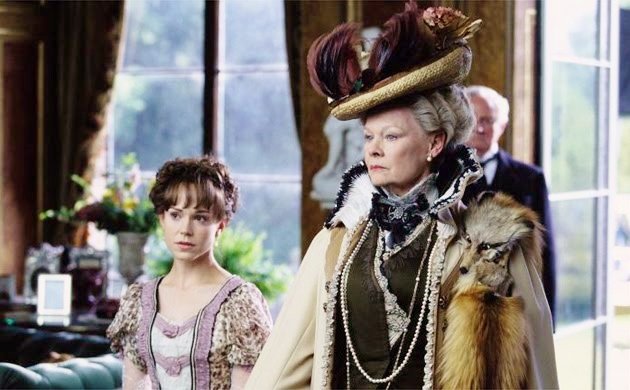
Judi Dench as Lady Bracknell and Frances O'Conor as Gwendolen - source
Of course, Lady Bracknell arrives also, having followed Gwendolen, and is shocked to learn of Algernon’s engagement to Cecily. She disapproves, at first, but when she learns Cecily is heiress to a large fortune, she changes her mind.
Jack tries to make a deal that he approves Cecily’s marriage to Algy, if Lady Bracknell approves his marriage to Gwendolen. She refuses.
The play culminates with the arrival of Miss Prism, Cecily’s governess, whom we learn used to work for the Bracknell family and disappeared from their home, almost thirty years ago, with a baby. She admits to having lost the baby, misplacing him in a handbag. Evidently, it is revealed the baby was none other than Jack Worthing, who, as it turns out, is the son of Lady Bracknell’s sister, and thus Algernon’s older brother. Incredibly, he was actually christened Ernest John. Obviously, the play has a happy end, with the couples embracing.
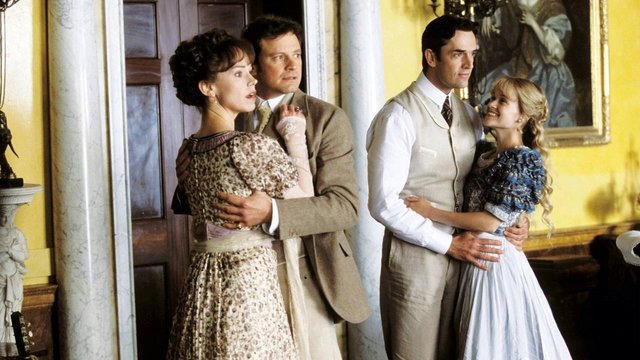
Frances O'Conor, Colin Firth, Rupert Everett and Reese Witherspoon - source
Let’s start with the word ‘earnest’ or ‘Ernest, if you will. It’s clear Wilde’s title has a double meaning, referring to the quality of being earnest (honest), and the obsession throughout the play of being called Ernest. Indeed, both Gwendolen and Cecily admit to having long dreamed of being married to a man named Ernest. Gwendolen even tells Jack that she can’t see herself marrying someone with any other name.
Ernest is, as the play suggests, an ideal husband – sincere, trustworthy, “safe”, and thus a desirable man. However, the characters themselves, are the opposite of Ernest. Or earnest. Both Algernon and Jack are cultivating double lives and making-up stories to escape the rigid values and etiquette of Victorian society. Being earnest, in their eyes, is not desirable, it’s dull.
‘The Importance of Being Earnest’, while riddled with comedy and hilarious double entendres, is a biting commentary on the duplicity and utter boredom and smugness of Victorian society. Note how the two male characters both pretend to be Ernest while in truth, they’re both lying and bending the truth to suit their own interests and desires. It shows how trivial society’s opinion really is. Just because society considers Jack to be Ernest/earnest, does not make him so.
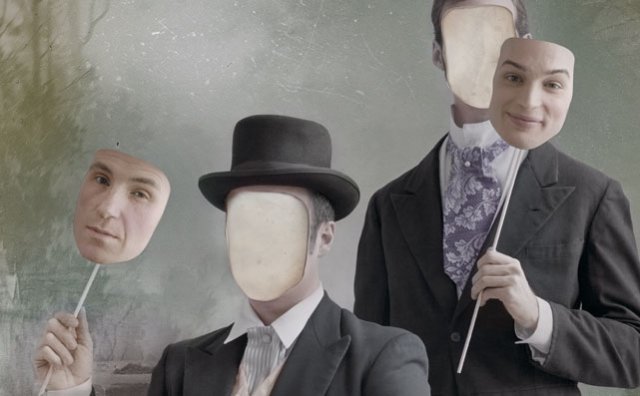
Adaptation at the National Arts Centre in Canada - source
Another interesting part of the play is the comment on marriage and the happiness/unhappiness of it. Indeed, the play begins with an exchange between Algernon and his servant, Lane, on the topic.
Algernon. Good heavens! Is marriage so demoralising as that?
Lane. I believe it is a very pleasant state, sir. I have had very little experience of it myself up to the present. I have only been married once. That was in consequence of a misunderstanding between myself and a young person.
A short while later, we are presented with two opposing views – that of the cynical Algernon, who regards marriage as “business” and claims that
A man who marries without knowing Bunbury has a very tedious time of it.
Suggesting marriage is so horrendous one must regularly escape it. And then, there is Jack, who plays the romantic here, idolizing Gwendolen and the happiness of marriage.
But Oscar Wilde goes to excessive lengths to prove that marriage is shallow and often, just as duplicitous as the characters themselves. We must remember that in Victorian society, marriage was a much different affair than what it is today – it was rarely a matter of love and it was usually the duty of the parents of a young lady to choose her a suitable husband, based on a number of things, such as wealth and assets, social standing and character.
Lady Bracknell. An engagement should come on a young girl as a surprise, pleasant or unpleasant, as the case may be.
Pleasant or unpleasant… And as was the case in those times, arranged marriages were mostly unpleasant and dull, although nobody would’ve admitted that. It must’ve been interesting (not to mention irritating) to Oscar Wilde to observe the double standards of a society that sent him to prison for being a homosexual.
‘The Importance of Being Earnest’ is a delightfully written play about the falseness of society and it’s applicable both in Victorian times, as well as today. It’s a play about appearances and shallowness, what with several characters adopting characteristics of ‘the dandy’ figure, so modern in those times. The dandy pretends to be all about appearances and what he displays on the surface, which in turn makes him appear shallow, trivial and lacking substance. Obviously, in making the characters appear so superficial, Wilde is taking yet another shot at the upper classes, who are unaware of their own tedium.
By now, I hope I have awakened your interest in the play and I would encourage you to go see it in theaters, if that’s available to you. If not, there is a really good movie adaptation starring Rupert Everett and Colin Firth, from 2002.
So, have you seen/read ‘The Importance of Being Earnest’? Are you a Wilde fan?
Authored by @honeydue
References: 12 3 4
Original Thumbnail Pic

Click on the coin to join our Discord Chat

Witness proposal is here:
Go To Steem Witness Page
In the bottom of the page type: adsactly-witness and press vote.

Use small letters and no "@" sign. Or, click here to vote directly!
Thank you!
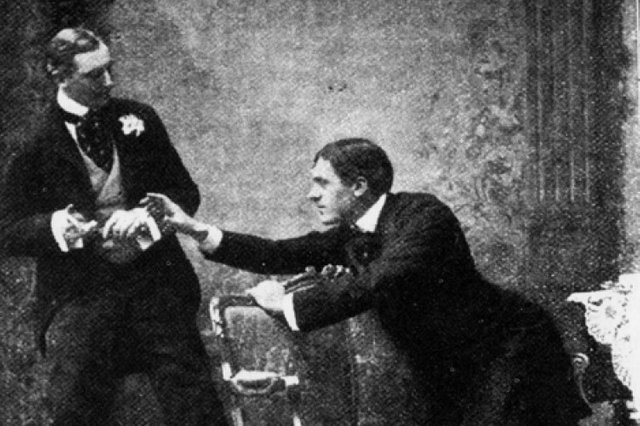
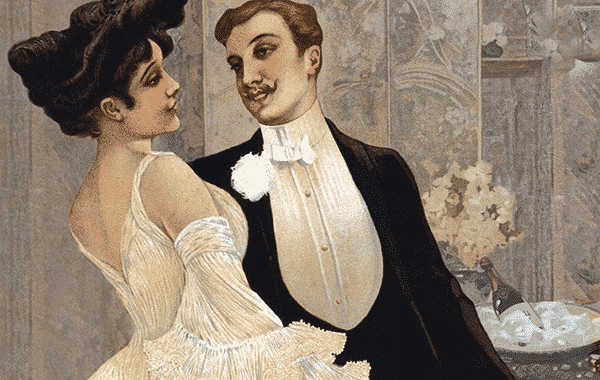
Oscar Wilde I know his narrative work, but unfortunately I have not read his play. I see from your review, that Wilde does not lose the opportunity to criticize the social bases of his time, to attack the Victorian morality; that just as there is comedy, there is also the sarcasm to which we are accustomed. From what you say, the work wants to convey that it is easy to deceive and be deceived. With this work I remember how some people can be different, or pass themselves off as someone else, according to their interests. I do not know how liberating it is to pretend to be someone else. Sure, that by this reading, I will look for the work to read it. Thanks for this post, @honeydue.
Do :) It's really great. OR see the movie - all the cast are masterful and it makes for a really fun view ;)
I love this play, as I love all of Wilde's work, particularly "The Picture of Dorian Gray."
I haven't seen this film version, though I have no doubt it is stellar, as it's hard to go wrong with Colin Firth, Rupert Everett and Judi Dench, all of whom are first rate actors.
I'll definitely have to check it out. Thanks for the recommendation.
Posted using Partiko Android
Definitely - they're all among my favorite actors and I really hope you enjoy it :D I know I did!! I love Dorian Gray too (did you happen to see the adaptation with Ben Barnes and - incidentally - Colin Firth as the older guy? Great too). And I probably would've featured it as well, if it wasn't a theater series. Still, might do that in a later post! Thank you for the feedback! :)
You're welcome! I enjoyed your post.
Posted using Partiko Android
Oscar Wilde is undoubtedly one of the most interesting writers of the late nineteenth century. From his vision and rebellious attitude, influenced by decadentism (a few months ago I wrote a post on this blog about decadentism and dandysm) in the second half of that century, he broke out against the morals established in England at the time. *The importance of being called Ernesto is, in the theatrical genre, an expression of his sharp irony and fine humour to reveal the hypocrisy and frivolity of society, particularly of its high class.
Thank you for your post on this attractive work by Wilde, @honeydue. Greetings.
Excelente resumen, ademas, tiene el mas sonado la obra El retrato de Dorian Gray, única novela, por cierto muy criticado.
@honeydue, In my opinion many movies, plays and drama series reflects many masks of lives which we see in Practical Life.
With time our situation changes and it's a natural process. No matter if one agrees or not, life is movie too and everyone wear a mask in this journey. Stay blessed.
Posted using Partiko Android